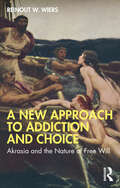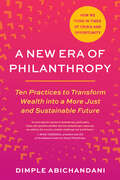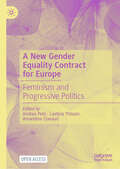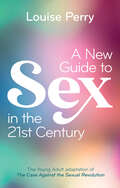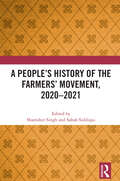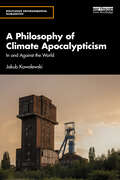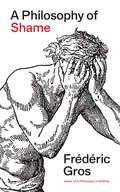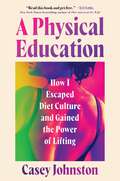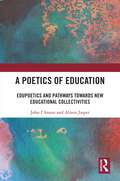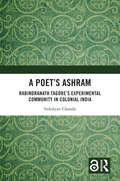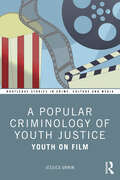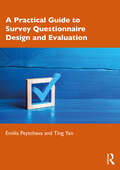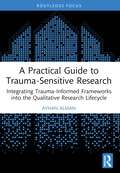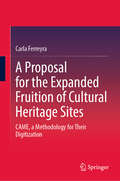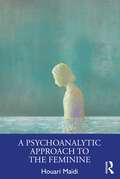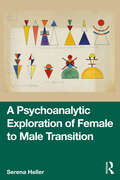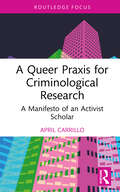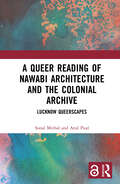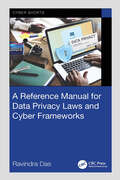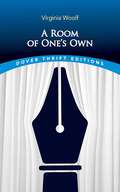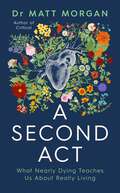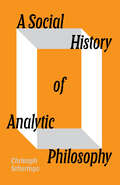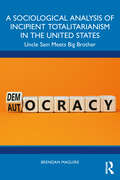- Table View
- List View
A New Approach to Addiction and Choice: Akrasia and the Nature of Free Will
by Reinout W. WiersThis engaging book provides a novel examination of the nature of addiction, suggesting that by exploring akrasia—the tendency to act against one’s better judgement—we can better understand our addictive behaviors. It offers an alternative to the dominant biomedical model of addiction as a chronic brain disease by looking at the nature of how we make decisions and proposing the idea that biased choice is central to addiction.The book looks at both classic substance use disorders and newer “addictions” to smartphones, meat and fossil fuels. It discusses current perspectives on free will in philosophy, psychology and neuroscience, and the questions surrounding free will versus determinism, including our ability to steer our behaviors guided by the promise of future outcomes. Different perspectives on addiction and choice are presented in an eloquent style, and illustrated by personal stories. Through a lively discussion of the key scientific and philosophical issues surrounding addiction, this book is valuable for students in psychology, criminology, sociology and social work, as well as health care professionals and general readers interested in the nature of our free will.
A New Era of Philanthropy: Ten Practices to Transform Wealth into a More Just and Sustainable Future-- How we fund in times of crisis and opportunity
by Dimple Abichandani&“A must-read for anyone in philanthropy, particularly those who question whether and how philanthropic resources can address the current, complex challenges our world faces.&” —Nick Tedesco, president and chief executive officer of the National Center for Family Philanthropy A blueprint for how wealth can be transformed into a more just and sustainable future in times of rapid change and crisis.On the cusp of the greatest wealth transfer in history—with $84 trillion dollars moving between generations in the next 20 years—this book explores how philanthropy can be transformative, and transformed.Can philanthropy be an anti-racist, feminist, relational, and joyful expression of solidarity?This book argues that it not only can be—for the future we seek, and for philanthropy to achieve its greatest impact, it must be.Nationally recognized philanthropic leader Dimple Abichandani revolutionizes the precepts of modern philanthropy. Offering 10 provocative practice shifts, A New Era of Philanthropy engages readers with fresh answers to the question of how philanthropy can meet this high-stakes moment—from reimagining governance to aligning investments to crisis funding and beyond.Abichandani highlights paradigm shifts that model the way forward, moving beyond critique into real transformation, with relatable stories about funders who are forging a new era of philanthropy.A New Era of Philanthropy picks up where key books like Decolonizing Wealth and Winners Take All leave off, offering a guide for donors, foundations, and non-profit leaders navigating philanthropy in urgent times. Clear-eyed, hopeful, and responsive to the moment, this book helps us reimagine the purpose and norms of modern philanthropy. It is an invitation to all of us who believe these resources can contribute to a more just future: start here.
A New Gender Equality Contract for Europe: Feminism and Progressive Politics
by Andrea Petö Laeticia Thissen Amandine ClavaudThis open access book, supported by FEPS and Fondation Jean-Jaurès, centres on the work of contemporary progressive feminist thinkers and the idea that there is no democracy without gender equality. The authors develop the concept of a feminism that works for everyone – regardless of their gender, social or cultural identity – in the context of EU policy. The book features gender experts with multidisciplinary backgrounds from across Europe, providing a comprehensive exploration of efforts to move away from “gender backlash” rhetoric and towards a new gender contract for a fairer, more equal European Union.
A New Guide to Sex in the 21st Century: The Young Adult Adaptation of 'The Case Against the Sexual Revolution'
by Louise PerryThe bestselling feminist book, now adapted for a young adult audienceBefore the 1960s, sex before marriage was frowned upon and pornography was difficult to get hold of. We are now much freer to do what we like – there has been a ‘sexual revolution’. This must be a good thing, right?Wrong, argues Louise Perry. These changes have had many negative consequences, especially for girls and women. The main winners from a world of rough sex, hook-ups and freely available porn are a tiny minority of rich and powerful men. Women have been forced to adapt to these changes in ways that often harm them.Louise Perry carefully guides readers through the difficulties of sex in the 21st century. Her advice will be invaluable to all young women and men who may be feeling lost in a world where ‘doing it’ can sometimes seem dangerous or confusing.
A People's History of the Farmers' Movement, 2020–2021
by Sabah Siddiqui Shamsher SinghIn the annals of India’s history, a monumental uprising unfolded in 2020, echoing the resilience and coming together of large sections of its agrarian base. Instigated by the contentious farm laws of 2020, the Farmers’ Movement burgeoned into a year-long saga of protest and perseverance, ending only in December 2021 after the passing of the Farm Laws Repeal Bill, 2021 by the Indian Parliament. From the initial demand for law repeal to the multifaceted growth of the movement, the book traces the journey of the Farmers’ Movement, as each essay dissects the socio-political dynamics, cultural nuances, and mass solidarity that underpinned the protests, including focused analyses from Delhi, Punjab, Haryana, Uttar Pradesh, Rajasthan, Maharashtra, and the Sikh diaspora in the United Kingdom. This anthology chronicles the ebb and flow of a nation’s spirit, encapsulating the symbiotic relationship between theory and praxis, between change and continuity. It serves as a testament to the power of collective resistance and a roadmap for future struggles, ensuring that the legacy of the Farmers’ Movement endures beyond the pages of history.This volume is an interdisciplinary project and will be of interest to scholars from diverse fields such as economics, sociology, public policy, political science, history, political geography, gender studies, cultural studies, international studies, architecture, media studies, psychology, and ethnomusicology.
A Philosophy of Climate Apocalypticism: In and Against the World (Routledge Environmental Humanities)
by Jakub KowalewskiThis book offers a long-overdue analysis of the ubiquity of eco-apocalypticism in current discourses on the climate crisis.Drawing on a wide range of sources and theoretical traditions from ecological works and radical pamphlets, through political theology and continental philosophy to ancient and medieval apocalypses, the book sheds a comprehensive light on the concepts, processes, and experiences which circulate around the figure of the environmental end of the world. Importantly, this book argues that apocalypticism can provide a productive philosophical framework for addressing the climate catastrophe, enabling us to propose a distinctive answer to the fundamental question which haunts progressive ecological projects: how can we defend the world we find indefensible?Appealing to students, academics, and researchers in philosophy, political theology, and environmental humanities, this book is a timely intervention which hopes to demonstrate that, when all else fails, it is the end of the world which may save the planet.
A Philosophy of Shame: A Revolutionary Emotion
by Frédéric GrosAn original reflection on shame as the central feeling of our age — the expression of an anger that is the necessary condition for new strugglesCan shame become a source of political strength? Faced with injustice, growing inequality and systemic violence, we cry out in shame. We feel ashamed of obscene wealth amid wider deprivation. We feel ashamed of humanity for its ruthless and relentless exploitation of the earth. We feel ashamed of the racism and sexism that permeate society and our everyday lives.This difficult emotion is not just sadness or a withdrawal into oneself, nor is it a paralysing sense of inadequacy. As Frédéric Gros argues in A Philosophy of Shame, it arises when our perception of reality rejects passivity and resignation and instead embraces imagination. Shame thus becomes the expression of an anger that is a powerful, transformative force —one that assumes a radical character.In dialogue with authors such as Primo Levi, Annie Ernaux, Virginie Despentes and James Baldwin, Gros explores a concept that is still little understood in its anthropological, moral, psychological and political depths. Shame is a revolutionary sentiment because it lies at the foundation of any path of subjective recognition, transformation and struggle.
A Physical Education: How I Escaped Diet Culture and Gained the Power of Lifting
by Casey JohnstonFrom the most visible woman writing about weightlifting today, a "profoundly engrossing" memoir and manifesto about how lifting helped dissolve her allegiance to diet culture; taught her to be at home in her body; and led her to grow every kind of strength (Elizabeth Greenwood). In A Physical Education, Casey Johnston recounts how she ventured into the brave new world of weightlifting, leaving behind years of restrictive eating and endless cardio. Woven through the trajectory of how she rebuilt her strength and confidence is a staggering exposé of the damaging doctrine spread by diet and fitness culture. Johnston's story dives deep into her own past relationships with calorie restriction, exercise, and codependency. As she progresses on her weightlifting journey, she begins to eat to fuel her growing strength—and her food cravings vanish. Her physical progress fuels a growing understanding of how mainstream messaging she received about women&’s bodies was about preserving the status quo. Previously convinced that physical improvement was a matter of suffering, she now knows it requires self-regard and patience. A little pushing at a time adds up to the reawakening of parts of herself she didn&’t even know were there.A Physical Education asks why so many of us spend our lives trying to get "healthy&” by actively making our bodies weaker. Casey Johnston is a voice for those of us who feel underdeveloped and unfulfilled in our bodies and are looking to come home to ourselves.
A Poetics of Education: Edupoetics and Pathways Towards New Educational Collectivities
by John I’Anson Alison JasperAt a time when education is routinely – and problematically – translated into the discourse of learning and teaching to serve a series of instrumental imperatives, the question of what we mean by education is raised with renewed urgency. This book looks beyond present horizons to imagine education anew. It considers ways of theorising education that acknowledge the complexity of its genealogy, empirical practice, and imbrication within regimes of governance, in the light of education’s orientation to both the already actualised and the new and unprecedented. A specifically educational milieu is characterised by the kinds of existential movements and negotiations to which this gives rise, together with a language and grammar for their articulation, that points to their urgency and significance.A poetics of education – an edupoetics – is thus a considered response to this exigency.Through engaging a variety of felicitous tropes – that include the sea and its navigation (Serres), opacity (Glissant), desire (ʿAṭṭār), precarity (Butler), gift (Manning), and chiasma (Merleau-Ponty), it becomes possible to articulate an educational image of thinking that, in welcoming the new and unforeseen, promotes a radical hospitality to difference. The chapters engage a variety of writers to explore how an edupoetics might intersect with a series of specific educational scenes and concerns that include, for example, the qualities of ‘good’ research that opens to the other-than-human, the complexities of doctoral supervision, the pedagogics of gender, and the gift of neurodiversity. This book articulates an alternative educational imaginary – an edupoetics – that gestures towards collectivities gathered around matters of intense concern. It will be relevant to scholars in the humanities and social sciences interested in educational theory and the philosophy of education.
A Poet’s Ashram: Rabindranath Tagore’s Experimental Community in Colonial India
by Sukalyan ChandaThe remarkably creative life Rabindranath Tagore (1861–1941) lived has long been an area of scholarly enquiry. Yet, surprisingly, his role as the founder of an experimental ashram community remains unexplored. A Poet’s Ashram retrieves his idea of his ashram through an exploration of his writings on the institutions he built.The ashram community Tagore endeavoured to create in Santiniketan during the period 1901–1941 was his response to the question of modernity. Through his effort to reinvent the ancient Indian ideal of the ashram, he articulated his idea of a mode of collective living that was meant to be grounded in a set of ethical values derived from India’s civilizational inheritance. This book traces the history of how his ashram school evolved into a community that practised egalitarianism, inclusiveness and creativity through its daily existence. It explores a range of nineteenth- and twentieth-century discourses and Tagore’s engagement with them in order to situate that idea within its historical context, a critical juncture in the history of modern India and the world. This book’s reading of his project unravels its anti-colonial underpinnings and the commonalities it shared with some of the other similar experimental communities that challenged illiberal ideologies and power relations during the early twentieth century.Meticulously researched and perceptively written, this book will be of interest to students and researchers of history, political science, culture studies and postcolonial studies. It will also be of interest to educationists, educators and those interested in colonial modernity, modern Indian history, philosophy of education, institution building, peace, inclusivity and sustainability.
A Popular Criminology of Youth Justice: Youth on Film (Routledge Studies in Crime, Culture and Media)
by Jessica UrwinAnalysing the representation of youth crime and justice-involved children in popular fictional films, this book explores how what we see on screen contributes to the perceptions of youth justice in society, policy, and practice.Putting forward the argument that fictional representations have a real-world impact on the opportunities available to children, each chapter in the book focuses on a different genre or type of film and considers the ways in which justice-involved children have been demonised, stereotyped, and harmed by their portrayal on the big screen. From James Dean and the birth of “monstrous youth” in Rebel Without A Cause to the current, more nuanced portrayals as seen in The Young Offenders, the book examines films throughout history and across different cultures. In doing so, it demonstrates how portrayals of justice-involved children have contributed to the social understanding of what youth crime is and who is to blame for it, and highlights how we can use this knowledge to better understand and support children.By combining youth justice theory with media analysis, A Popular Criminology of Youth Justice: Youth on Film makes a novel contribution to both fields and will be of great interest to students and researchers in the areas of youth crime, youth justice, and the media.
A Practical Guide to Survey Questionnaire Design and Evaluation
by Emilia Peytcheva Ting YanA Practical Guide to Survey Questionnaire Design and Evaluation summarizes principles, guidelines, and best practices for developing and testing survey questionnaires driven and supported by theoretical and empirical research. It provides a broad overview of literature on questionnaire design, drawing on both theoretical and empirical research.This book consists of three parts. The first covers the survey response process model, which will serve as the theoretical framework to establish the basic principles of writing different types of survey questions (attitudinal, behavioral, demographic, and knowledge). The second part of this book focuses on special topics such as sensitive questions, developing questionnaires for older adults and children, designing a paper survey, designing a web survey and optimizing for a mobile device, developing questionnaires for a multimode survey, and conducting surveys in multiple languages and cultures. The third part of this book describes methods for testing and evaluating survey questions. Topics cover focus groups, cognitive interviewing, expert review, Questionnaire Appraisal System, behavior coding, respondent and interviewer debriefing, randomized experiments, and pilot studies. Given extensive web survey coverage, we also discuss usability testing of web surveys. Finally, we present a brief overview of the use of artificial intelligence and machine learning for questionnaire development and evaluation. Suggestions for further reading, case studies, and discussion questions are included in all chapters.This book will be of interest to those using survey methodology/questionnaires and graduate courses incorporating survey design across the social and behavioral sciences, including psychology, communication studies, nursing and healthcare research, sociology, anthropology, and education.
A Practical Guide to Trauma-Sensitive Research: Integrating Trauma-Informed Frameworks into the Qualitative Research Lifecycle
by Ayhan AlmanA Practical Guide to Trauma-Sensitive Research showcases the novel idea of trauma-informed interventions for researchers, proposing clinical supervision as the standard rather than the exception. This framework not only aids in managing the aftermath of trauma but also opens new opportunities for both clinicians and researchers.The book details the theoretical foundations of trauma, including the latest insights into how trauma affects individuals and communities, and addresses practical applications of trauma-sensitive methodologies in research. It emphasises ethical considerations, the importance of clinical supervision, and the necessity of adopting a trauma-sensitive approach to protect both research participants and researchers from the potential emotional toll of exposure to trauma. By bridging clinical practices with qualitative research, this book not only opens new professional avenues for clinicians and researchers but also advocates for a research environment that is empathetic, ethical, and informed by a deep understanding of trauma and its impacts.A Practical Guide to Trauma-Sensitive Research will be of great utility to User Experience (UX) Professionals, such as service designers, UX designers, consultants, and researchers involved in qualitative research. Additionally, it will be of value to clinical professionals like social workers, psychologists, and psychotherapists, offering insights and supervision on applying trauma-informed approaches in non-clinical research settings.
A Proposal for the Expanded Fruition of Cultural Heritage Sites: CAME, a Methodology for Their Digitization
by Carla FerreyraThis book presents a comprehensive methodology, integrating analysis, digitization, and the preservation of cultural heritage. It investigates three potential UNESCO World Heritage Sites, in Italy, Germany and South Africa, and employs a blend of documentary research and advanced digital surveying and data processing techniques. The volume shows how these efforts yielded actionable strategies to meet society's evolving demands for surveying, recovery, and conservation. The book documents the work behind the overarching objective which was to digitize, analyze, categorize, and store all collected data within a BIM framework, with the aim of streamlining collaboration, enhancing management efficiency, and optimizing processes. It demonstrates the utilization of digital tools in not only amplifying traditional scientific-technological approaches to heritage protection, but also its role in reshaping the perception, comprehension, and communication of heritage. This fosters the development of more sustainable conservation strategies.
A Psychoanalytic Approach to the Feminine
by Houari MaïdiA Psychoanalytic Approach to the Feminine sees Houari Maïdi dissect the concepts and characteristics of the feminine in both males and females, separating them from womanhood and femininity, and equipping readers with the tools to better understand pathologies such as masochism, narcissism, depression, and paranoia.Starting from Freud’s binary depiction of gender identity through the lens of bisexuality, Maïdi seeks to redress the way in which traditional psychoanalysis considers sexual characteristics. He separates the feminine from gender, showing how historically misogynistic theories in psychoanalysis have potentially damaged the progress of the field, as well as female and male analysands alike. Depictions of the feminine are considered through their relationship with traumatic seduction, mourning and melancholy to address questions related to different clinical and psychopathological representations.Using clinical vignettes throughout, this book is essential reading for psychoanalysts and those interested in the intersection between gender and analysis.
A Psychoanalytic Exploration of Female to Male Transition
by Serena HellerDrawing on theory from a range of schools of psychoanalytic thought, this timely book addresses and explores the phenomenon of the increasing number of people who were assigned female at birth and now identify as male, and what might underly the cultural pull to remove femaleness from self and body.In A Psychoanalytic Exploration of Female to Male Transition, Serena Heller considers how early recognition of the difference between the sexes might evoke a melancholic attitude towards one’s anatomy, as being one sex and not the other. She considers the ramifications of the developing sexual bodies of young women at a time when they are having great difficulty accepting them, addressing the complexity of female sexual development in relation to sexual aim and object, and how manifestations of early bisexuality can resurface during puberty. Focusing solely on the experience of female-to-male transition, rather than making broad assumptions of a universal trans experience, Heller provides a depth of theoretical analysis of biological and psychic aspects of female sexuality, and trans gender identifications.Empathetic in its approach and thorough in its conceptualisation, this volume is a vital resource for psychodynamic and psychoanalytic psychotherapists working directly with trans patients, and with those experiencing gender dysphoria and issues of sexual identity. The book assumes no prior expertise in analytic thought, and is designed to help mental health practitioners, students and researchers engaged in queer studies, gender studies and the intersection of psychoanalytic thought and gender identity.
A Queer Praxis for Criminological Research: A Manifesto of an Activist Scholar (Queering Criminology and Criminal Justice)
by April CarrilloA Queer Praxis for Criminological Research provides an alternative research method, where researchers place themselves second to draw narratives from folx who are typically sought out by scholars because of their identity.Describing the author’s use of queer praxis during a recent study, the chapters of this book demonstrate how the rigor of qualitative research was achieved by utilizing a queer methodology. It presents how the author interviewed trans folx about their experiences with the criminal legal system; explores their volunteer work with a local group in the trans community; and discusses how, before collecting any data, they spent eight months being a part of their lives and witnessing their everyday experiences. Based on these experiences, the book reveals how individual researchers can increase academic rigor and transparency and cultivate skills to complete qualitative criminological work. Using personal anecdotes, expert advice, applied examples from study and instrument design, triumphs, and losses, the book puts forward the argument that we can integrate communities into our academic research in meaningful ways to further both the discipline and our pursuit of social justice. In doing so, it seeks to inspire researchers to apply these concepts in their own work, no matter the type of methodology, revealing that as criminologists whose data sets emerge from some of the most personal moments in people’s lives, we have a stronger obligation to ensure that our findings empower, not demoralize, marginalized people.Written to be both instructional and inspirational, A Queer Praxis for Criminological Research will be of great interest to students and scholars of criminology.
A Queer Reading of Nawabi Architecture and the Colonial Archive: Lucknow Queerscapes
by Sonal Mithal Arul PaulA Queer Reading of Nawabi Architecture and the Colonial Archive explores the architectural production of nawabs Asaf-ud-Daula and Wajid Ali Shah and reveals the colonial bias against queer expression. It offers methods of using queer strategies to read archival evidence against the grain and rewrite erased, overlooked, and suppressed histories.The book provides its readers a unique queer postcolonial architectural history of Lucknow from 1775–1857. It highlights the nawabs’ non-normative expressions, which not only offered a fierce resistance to the colonial enterprise but also were instrumental in furthering Lucknow as a cultural center. It simultaneously extracts parameters from queer studies and redefines them to illustrate ways in which queer architecture can be characterized. It reconstructs the footprint of nawabi architecture erased by the colonial enterprise and places it back on map—an exercise not undertaken meticulously until now. A Queer Reading of Nawabi Architecture and the Colonial Archive is intended for scholars and students of queer studies, postcolonial studies, architectural history, and the global south, as well as the citizens of Lucknow.
A Reference Manual for Data Privacy Laws and Cyber Frameworks (Cyber Shorts)
by Ravindra DasAs the world is becoming more digital and entwined together, the cybersecurity threat landscape has no doubt become a daunting one. For example, typical threat variants of the past, especially those of phishing, have now become much more sophisticated and covert in nature. A lot of this has been brought on by the proliferation of ransomware, which exploded during the COVID-19 pandemic. Now, there is another concern that is looming on the horizon: data privacy. Now, more than ever, consumers on a global basis want to know exactly what is happening to their personal identifiable information (PII) datasets. Examples of what they want to know about include the following: What kinds and types of information and data are being collected about them How those PII datasets are being stored, processed, and transacted with How their PII datasets are being used by third-party suppliers In response to these concerns and fears, as well as the cyber risks posed by these datasets, many nations around the world have set up rather extensive and very detailed data privacy laws. In their respective tenets and provisions, these pieces of legislation not only specify why and how businesses need to comply with them, but also outline the rights that are afforded to each and every consumer. In this book, we detail the tenets and provisions of three key data privacy laws: The GDPR The CCPA The CMMC We also provide a general framework at the end on how a business can comply with these various data privacy laws.The book begins with an in-depth overview of the importance of data and datasets, and how they are so relevant to the data privacy laws just mentioned.
A Room of One's Own (Dover Thrift Editions: Literary Collections)
by Virginia WoolfVirginia Woolf unveils the societal barriers faced by women and explores the crucial link between women's financial independence and creative freedom in this extraordinary collection of essays. Initially presented as lectures in 1928 at Newnham College and Girton College, the University of Cambridge's women's colleges, this seminal work argues for a literal and figurative space for women writers within a patriarchal literary tradition. Woolf's essays constitute a foundational feminist text, highlighting the historical marginalization of women, advocating for equality, and emphasizing the importance of women's contributions to literature and beyond. Essential reading for anyone interested in feminism, literature, and women's history, A Room of One's Own resonates profoundly in today's ongoing gender discussions.
A Room of One's Own (Vintage Classics)
by Virginia WoolfVirginia Woolf&’s classic plea for a world in which women are free to use their gifts is as powerful and resonant as ever.In this influential extended essay, Virginia Woolf outlined what women need in order to fully make use of their abilities. Using powerful images and memorable thought experiments--such as a fictional sister of William Shakespeare, who is as talented as her brother but limited in ways he was not--Woolf analyzes the many ways in which women have been held back throughout history and still are in her own time. First published in 1929, A Room of One's Own has been a towering and inspirational statement of feminist principles for nearly a century--and remains relevant now, at a time of growing awareness of the kind of social injustices that she decried.
A Second Act: What Nearly Dying Teaches Us About Really Living
by Dr Matt MorganI&’ve worked as a doctor for over twenty years, caring for patients who are in the thick fog between life and death. I&’ve met hundreds of people who have died, were resuscitated and lived. I&’ve long thought that these are the people that we should be listening to, not influencers or business gurus. They know what really matters. Dr Matt Morgan has met hundreds of people who&’ve come back from the dead. Their hearts stopped, their bodies unresponsive, rescued from the brink of death by the modern intensive care techniques he specialises in. People like Ed, who was walking through a park when there was a bang, a bright light and then nothing. Ed had been hit by a bolt of lightning – 300 million volts, enough to power a city for a day, coursed through his body, short-circuiting his heart. Ed was given life-saving CPR and he survived. He lives a little differently now, every day knowing the thin margins that separate life and death. In A Second Act, Morgan introduces us to patients who&’ve experienced hypothermia, overdoses, heart attacks and transplants to see how their lives have been transformed by the second chance they&’ve been given. He shares the lessons they&’ve learned, along with his own realisations about life and how to make the most of it. Life shouldn&’t be wasted on the living.
A Social History of Analytic Philosophy
by Christoph SchuringaHow a supposedly apolitical form of philosophy owes its continuing power to social and political forcesAnalytic philosophy is the leading form of philosophy in the English-speaking world. What explains its continued success? Christoph Schuringa argues that its enduring power can only be understood by examining its social history. Analytic philosophy tends to think of itself as concerned with eternal questions, transcending the changing scenes of history. It thinks of itself as apolitical. This book, however, convincingly shows that the opposite is true.The origins of analytic philosophy are in a set of distinct movements, shaped by high-ly specific sets of political and social forces. Only after the Second World War were these disparate, often dynamic movements joined together to make &‘analytic philosophy&’ as we know it. In the climate of McCarthyism, analytic philosophy was robbed of political force.To this day, analytic philosophy is the ideology of the status quo. It may seem arcane and largely removed from the real world, but it is a crucial component in upholding liberalism, through its central role in elite educational institutions. As Schuringa concludes, the apparently increasing friendliness of analytic philosophers to rival approaches in philosophy should be understood as a form of colonization; thanks to its hegemonic status, it reformats all it touches in service of its own imperatives, going so far as to colonize decolonial efforts in the discipline.
A Sociological Analysis of Incipient Totalitarianism in the United States: Uncle Sam Meets Big Brother
by Brendan MaguireUsing George Orwell’s novel Nineteen Eighty-Four as a guide for interpreting the role of the American state in the twenty-first century – paying particular attention to how the government responded to the life and death issues of terrorism, COVID-19, and climate change – this book presents eye-opening and compelling documentary evidence that suggests Orwellian policies have already been implemented by Republicans and Democrats.A Sociological Analysis of Incipient Totalitarianism in the United States advances a groundbreaking sociological explanation for how totalitarian rule is embraced by the public when freedom, equality, and justice are compromised, offering a sociological explanation of how totalitarian rule is operationalized from the macro level to the micro level, using concepts associated with Marx (ruling ideas), Mead (generalized other) and Berger and Luckmann (recipe knowledge) which are especially key to understanding the process. Finally, the book suggests policies that could halt and reverse the progression of totalitarianism in the United States.Scholarly and yet readily accessible to a general readership, this book showcases the sociological importance and enduring influence of Orwell – working as a supplement to Orwell’s Nineteen Eighty-Four and making a meaningful contribution to the public discourse by challenging and informing students and the public about the very real fears of creeping totalitarianism in the United States.
A Sociological Perspective on Blood Plasma Donation During the Pandemic: Convalescent Gifts and Liminality (Routledge Advances in Sociology)
by Jae-Mahn Shim Seung-Hyun BaekShim and Baek examine the evolving existential meanings of gift-making by interviewing donors of convalescent blood plasma during the Covid-19 pandemic.The book reveals what plasma donation means for their efforts to reassemble their lives from being liminal moments to livable experiences, through interviews with convalescent donors in South Korea. It shows it is the very multiplex meanings of plasma donations that enabled people to effectively maneuver through the challenging liminality in life during COVID-19, by expanding the existing literature of gifts and donation that highlights the rich, complex meanings of the body parts donated. It presents a vivid dialogue between liminality and gift-making from varied narratives.A vital read for scholars, students of sociology, anthropology, and public health and those interested in how subjects reconstitute their agency amid uncertainty inside and outside the pandemic, so that we appreciate the voices of donors and learn from the lived experiences of those in this book.
